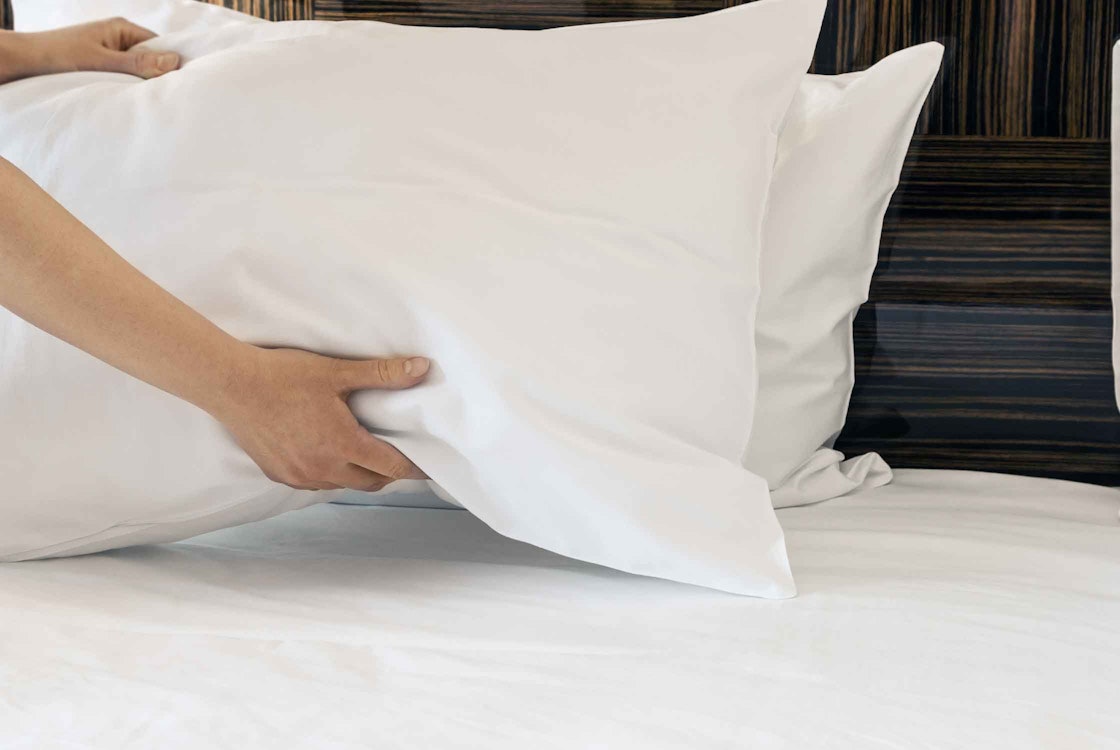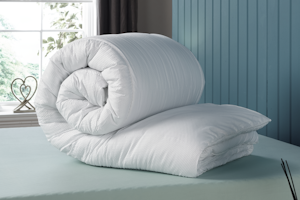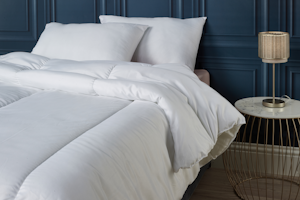20 Mar 2025

Pillow Buying Guide: Finding the Perfect Pillow for Your Needs
07 May 2024
Pillows play a crucial role in providing a comfortable and restful night's sleep, as they support the head and neck while you sleep. With an array of options on the market, selecting the perfect pillow may seem daunting. However, by considering factors such as materials, sleeping position, and budget, you can find the right one that suits your needs.
Pillow materials encompass a range of options, including memory foam, down, latex, and synthetic fibres. Each material offers varying levels of support and comfort, so it's essential to identify your personal preferences beforehand. Additionally, it's important to consider your sleeping position, whether you're a side, back, or stomach sleeper, as each position benefits from different levels of firmness and loft. Finally, speciality pillows and care and maintenance considerations should be taken into account to ensure the pillow meets your specific requirements and lasts a long time.
Pillow Materials
Down Pillows
Down pillows are filled with the soft plumage found beneath a bird's feathers, typically from geese or ducks. They are known for their luxurious comfort and excellent insulation properties. Down pillows can provide superior softness, but may not offer enough support for all sleepers, especially those who need more firmness for neck and spine alignment. Down pillows are generally more expensive, but can provide long-lasting comfort if properly cared for.
Memory Foam Pillows
Memory foam pillows have become increasingly popular due to their ability to contour to the shape of your head and neck, offering optimal support and pressure relief. These pillows can be especially beneficial for those with neck pain or stiffness, as they help maintain proper spinal alignment during sleep. However, memory foam pillows may not be suitable for hot sleepers, as they tend to retain heat.
Feather Pillows
Feather pillows are similar to down pillows, but they use larger and more rigid feathers, typically from geese or ducks. These pillows provide a mix of support and softness, but may require regular fluffing to maintain their shape. Feather pillows are generally more affordable than down pillows, but they may not last as long and can sometimes be associated with allergies.
Latex Pillows
Latex pillows are made from either natural or synthetic rubber, and they offer a unique combination of support and pressure relief. These pillows are naturally hypoallergenic, resistant to dust mites, and tend to be more durable than other pillow materials. However, latex pillows can be somewhat heavy and may have a noticeable smell at first.
Down Alternative
Down alternative pillows aim to provide the softness and luxury of down without using actual down. These pillows are often filled with synthetic materials such as polyester or microfiber, designed to mimic the feel of down. Down alternative pillows can be a more affordable and hypoallergenic option, but they may not have the same level of insulation or durability as genuine down.
Polyester Pillows
Polyester pillows are among the most common and affordable options available. They are filled with synthetic fibers that provide a supportive yet soft feel. Polyester pillows are lightweight and easy to care for, but they may lose their shape more quickly than other pillow materials and may not provide the same level of support or pressure relief as memory foam or latex.
Cotton Pillows
Cotton pillows are filled with natural cotton fibers, offering a soft and comfortable option for those who prefer an all-natural sleeping surface. While cotton pillows are breathable and hypoallergenic, they may not offer as much support or durability compared to other pillow materials. Additionally, cotton pillows can flatten over time, affecting their overall comfort and support.
Sleeping Position Considerations
When looking for a pillow, it's essential to consider your sleeping position. The right pillow can significantly impact your sleep quality by providing proper support and promoting a healthy sleep posture. Let's discuss the different sleeping positions and their pillow requirements.
Side Sleepers
For those who sleep on their sides, it's crucial to find a pillow with the right thickness and firmness. A pillow with a higher loft and medium-firm to firm support is ideal for side sleepers, as it can help to maintain proper spinal alignment and prevent neck pain. Features to look for in a pillow for side sleepers include:
- Contoured shape: This helps to support the neck and shoulders.
- Adjustable loft: Allows customisation of pillow height for individual preferences.
- Firm support: Maintains the natural curvature of the neck and spine.
Back Sleepers
Back sleepers need a pillow that provides adequate support for their head, neck, and shoulders without causing discomfort. It's essential to choose a pillow with a medium loft and medium-firm support to prevent the head from being pushed too far forward or backward. Suitable features for back sleepers include:
- Moderate thickness: Helps to cradle the head and neck without causing strain.
- Material: Memory foam, latex, or shredded foam that conforms to the head and neck shape.
- Breathability: Ventilated designs or cooling fabrics are not essential but can contribute to a more comfortable sleep experience.
Stomach Sleepers
Stomach sleepers require a pillow that is thinner and softer as compared to side and back sleepers. A low loft with soft support is necessary to prevent undue strain on the neck and spine. Features to consider for stomach sleepers include:
- Low loft: Reduces pressure on the neck and helps maintain a neutral spine position.
- Soft support: Provides cushioning without causing head elevation.
- Hypoallergenic materials: Encourages a healthy sleep environment, especially for allergy-sensitive individuals.
By taking your sleeping position into account and selecting a pillow with the appropriate features, you can enhance your sleep quality, reduce discomfort, and wake up feeling refreshed and rejuvenated.
Pillow Firmness and Loft
Choosing the right pillow can be an essential factor in achieving a comfortable and restful night's sleep. Two crucial aspects to consider when purchasing a pillow are its firmness and loft. Firmness relates to how hard or soft a pillow feels, while loft refers to the pillow's height when laid flat.
There are various levels of pillow firmness, ranging from soft to firm. Soft pillows tend to be more suitable for stomach sleepers, as they help to reduce strain on the neck. Medium-firm pillows are versatile and can accommodate most sleeping positions, including side and back sleepers. These pillows provide a balance of support and comfort, adjusting to the sleeper's movements throughout the night. Firm pillows are ideal for side sleepers, as they help maintain the spine's alignment and prevent neck pain.
Pillow loft can significantly impact the overall support and comfort a pillow provides. A low-loft pillow is usually less than 3 inches in height, making it optimal for stomach sleepers. A medium-loft pillow, between 3 and 5 inches, caters to various sleeping positions and is often preferred by back sleepers. Finally, a high-loft pillow, over 5 inches tall, provides excellent head and neck support for side sleepers.
When selecting a pillow, one must take both firmness and loft into account, as they are vital in ensuring proper support and alignment for the head, neck, and spine. Additionally, it is essential to consider pillow size, which typically comes in standard, queen, and king sizes. The appropriate pillow size depends on personal preference, bed size, and the number of pillows you use.
In conclusion, finding the perfect pillow involves considering several factors, including firmness, loft, quality, size, and support. A good quality pillow should maintain its shape and provide consistent support over time. By taking these factors into account, one can significantly improve their sleep quality and reduce discomfort, such as neck pain, leading to a more restful slumber.
Speciality Pillows
Body Pillows
Body pillows are designed to provide extra support for the entire body, which can be especially helpful for individuals with back pain or pregnant women. These pillows come in various shapes and sizes, such as U-shaped, C-shaped, and long rectangular forms. They can help with maintaining proper spinal alignment and offer support to alleviate pressure on the hips and shoulders.
Cooling Pillows
For those who struggle with night sweats or need improved temperature regulation, cooling pillows might be the solution. These pillows often incorporate gel-infused memory foam or phase-change materials that help regulate temperature, keeping the head and neck cool throughout the night.
Adjustable Pillows
A perfect pillow can be subjective, so adjustable pillows have gained popularity for their customisability. These pillows typically come with removable layers or filling, allowing sleepers to adjust the pillow's loft and firmness to their preference. This feature ensures a tailored sleep experience and can accommodate individuals with varying sleep preferences or those who change sleeping positions throughout the night.
Hypoallergenic Pillows
For individuals with allergies or sensitive skin, hypoallergenic pillows are a blessing. These pillows are designed with materials that resist allergens like dust mites, mould, and bacteria. They often feature covers made from tightly woven fabrics or include an additional pillow protector, ensuring a cleaner and safer sleep environment.
Ethical Pillows
With an increasing focus on ethical and sustainable practices, there are now pillows available that cater to these values. Ethical pillows often use natural, organic, or vegan materials, such as buckwheat or kapok filling, and avoid using any animal by-products like down or feathers. These pillows provide a responsible sleep experience while still offering comfort and support.
Pillow Care and Maintenance
Proper pillow care and maintenance are essential for ensuring quality sleep and prolonging the life of your pillows. Regular cleaning helps prevent bacteria build-up, stains, and discolouration while maintaining the pillow's durability.
One effective way to protect your pillows is by using a pillow protector. These covers are moisture-wicking and help keep the pillow clean by acting as a barrier against sweat, oil, and other contaminants. They are also easily removable, making them convenient to wash.
When it comes to washing the pillows, always follow the care instructions provided by the manufacturer. Different types of fillings, such as feathers, down, fibre-fill, and foam, may require specific cleaning methods. Some can be machine-washed, while others might need hand washing or professional cleaning. Regularly washing your pillows helps eliminate allergens, bacteria, and odours.
Air-drying the pillows is a useful technique to maintain their fluffiness and prevent the growth of mould and mildew. Ensure they are completely dry before using them again, as moisture retained within the pillow can lead to unpleasant odours and bacterial growth.
In addition to cleaning, regularly flipping and fluffing your pillows is crucial. This practice helps evenly distribute the filling, maintaining its shape and support. It also prevents the development of imprints where your head consistently rests.
It's worth noting that even with proper care, pillows have a finite lifespan. On average, it's advisable to replace your pillows every 1-2 years. Keep an eye out for signs of wear, such as clumping, loss of support, or lingering odours, as these indicate that it's time for a new one.
By following these pillow care and maintenance tips, you can ensure a comfortable and healthy sleep environment while maintaining the longevity of your pillows.
Budget Considerations
When looking for a pillow, it's crucial to consider your budget as there are various options available at different price points. Before starting your research, it's important to establish the maximum amount you're willing to spend.
The cost of a pillow can vary greatly depending on factors such as fill material, quality, and size. Generally, synthetic and down-alternative pillows tend to be more affordable, while natural fill materials like down or feather can be more expensive. However, pricier pillows often provide better support, longevity, and airflow.
It's essential to balance the pillow's cost with its performance and suitability for your body type and sleeping position. For instance, side sleepers require firmer pillows to support their head and maintain spinal alignment, while back and stomach sleepers need a thinner, softer pillow to prevent discomfort to the head and neck. The right pillow can help to alleviate pressure points and ensure a comfortable night's sleep.
Take time to research various types of pillows and their features, ensuring you select the appropriate fill material and the pillow fill that works best for your needs. Comfort is subjective, so don't be swayed by marketing claims or brand reputations. Instead, focus on your own preferences and requirements.
If you suffer from allergies, it's essential to choose a hypoallergenic pillow fill, such as down-alternative or synthetic materials, or ensure the pillow is made from a hypoallergenic fabric like Tencel. This can help prevent discomfort and allergic reactions.
When shopping for pillows, keep an eye out for sales and discounts offered by retailers, as this can be an excellent opportunity to find high-quality pillows at a lower cost. In addition, remember that investing in a good-quality pillow that properly supports your head and neck can improve your sleep quality, ultimately positively impacting your overall health and well-being.
In conclusion, considering your budget is an important aspect of the pillow-buying process. Researching various options, understanding fill materials, and considering your specific needs—including sleeping position, body type, and allergy considerations—can help you find the perfect pillow within your budget while ensuring the best possible sleep experience.


